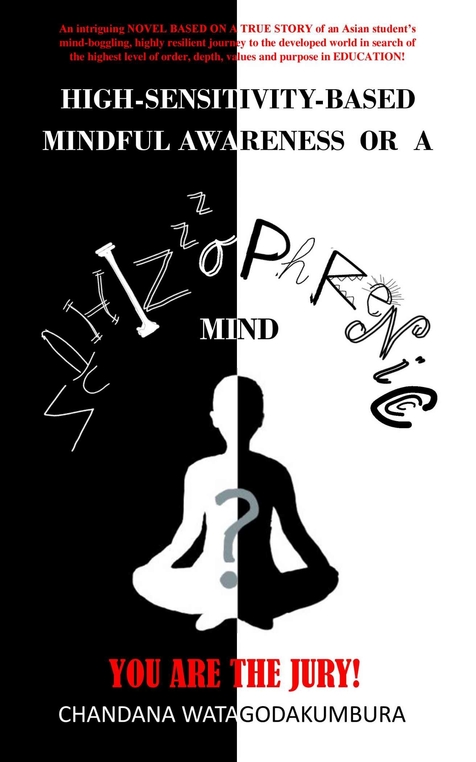The complicated journey of life, through the eyes of an academic far from home, spills out onto the pages of High-Sensitivity-Based Mindful Awareness or a Schizophrenic Mind?: You are the Jury! by author Chandana Watagodakumbura. When Chelian gets the opportunity to travel to the western world – the fictional country of Astort – to pursue his Masters degree, he begins an existential journey that will take him countless miles over the course of two decades.
As the central character, Chelian maneuvers through a foreign land as best he can, confident in his own intelligence and creative streak, despite his inability to communicate that to those around him. Entering a difficult academic program is only the first of his many challenges in this strange place. From being doubted and dismissed by his peers to the amusing trials of attempting to get a driver’s license, learning how to survive comes in many forms. However, his past life is never far from his mind, as is the medication he must take to control his psychiatric condition – the result of a mysterious event ten years earlier.
This is a short read, but it encompasses some huge questions, and touches on many critical themes in self-actualization and personal development. Chelian is an incredibly empathic person, with high intelligence and sensitivity, which makes him both delicate and strong. His movements through this fictional world are a vehicle by which to talk about certain personality types, creatives who refuse to conform, and who so often flirt with mental illness.
As a philosophical exploration through the lens of a single life, this book provides a lot to think about concerning how we educate, manage, and understand gifted individuals. The storyline is interesting, but the underlying conversation is far more appealing, particularly given that the writing is lacking in some key ways.
While the content and intention is valid and fascinating, the execution of this story is unfortunately quite problematic. There are numerous grammatical errors on every page, as well as misspelled words, run-on sentences, and other basic elements that make the reading process difficult. Additionally, the author expresses both simple and complicated ideas in unnecessarily wordy ways. Given the ideas tackled in this book are intricate and abstract, meaning can be easily misconstrued when language is not used in a clear way.
As it stands, regardless of how profound the revelations may in the book, they are not expressed accessibly, and readers may have to re-read passages multiple times, which interrupts the thoughtful, philosophical flow the author is trying to achieve. The ideas Watagodakumbura wants to shed light on with this book are important and deserve space and proper explication, and trying to layer these heady concepts beneath a narrative story, a la Robert Pirsig, is a difficult task for any author. Trying to do this in less than 120 pages through the medium of a rough-edged memoir is simply too ambitious in this current form.
The author is clearly a great thinker, and wants to tell his story in a unique way, but the structure and execution of this novel need significant improvement before readers can fully appreciate what the novel is trying to express.
Book Links
STAR RATING
Design
Content
Editing
Get an Editorial Review | Get Amazon Sales & Reviews | Get Edited | Get Beta Readers | Enter the SPR Book Awards | Other Marketing Services
























Leave A Comment